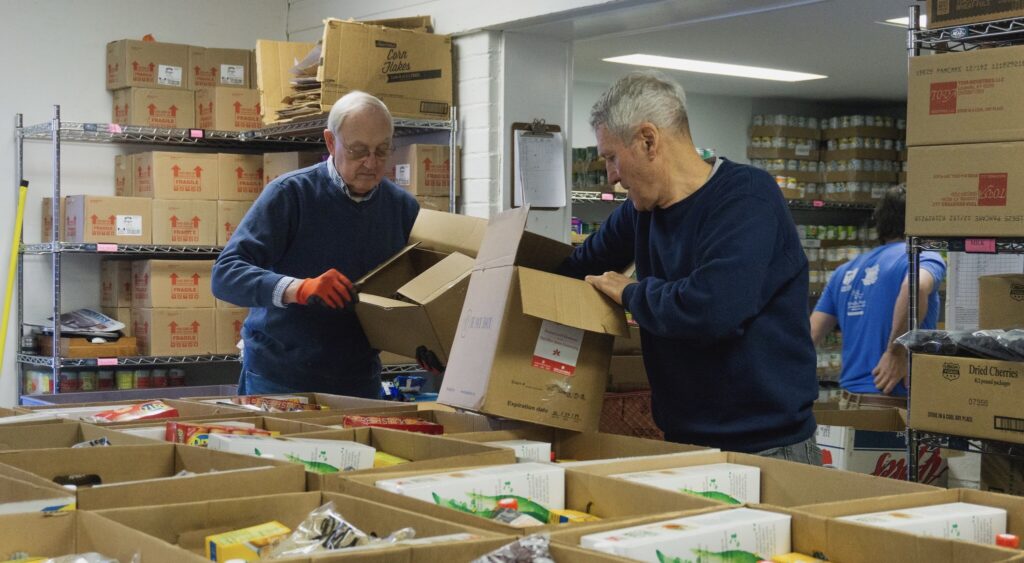Local food pantries kept their doors open through federal government shutdown

Volunteers work at the Athens facility. Submitted photo.

Local food pantries kept their doors open through federal government shutdown
LOGAN, Ohio – It’s been over a month since the end of the federal government shutdown, yet Southeast Ohio’s low-income families are still seeing the effects in their cupboards and refrigerators.
The shutdown caused a shift in the distribution of benefits from the Supplemental Nutrition Assistance Program (SNAP), also referred to as food stamps. February benefits were loaded on recipients’ Electronic Benefit Transfer (EBT) cards in mid-January, and March benefits have been divided through February and March.
According to David Keller, Development Coordinator for Hocking Athens Perry Community Action (HAPCAP), this method of distribution was a strong move by the state of Ohio to prevent a “SNAP Gap,” or a lapse in food assistance coverage at the end of February.
The SNAP Gap was also mitigated thanks to generous grants from Hunger Solutions of the Mid-Ohio Valley and OhioHealth O’Bleness Hospital. Both organizations covered the maintenance and delivery costs for additional food distributions in February. This was greatly appreciated by pantries across the Southeast Ohio Foodbank’s 10-county region.
“We definitely noticed an uptick in the number of people we served this February,” says Keller. “Especially senior citizens.”
The Southeast Ohio Foodbank & Kitchen, a HAPCAP program, served over 800 additional people in February 2019 compared to February 2018. Of these 856 people, one-third of them were seniors. The Foodbank also saw a near 10% increase in Grandparent households (seniors raising their grandchildren).
The Athens County Food Pantry is a member of the Southeast Ohio Foodbank. They receive inventory from the Foodbank and then assemble boxes and bags to give to those needing emergency food assistance at Athens County Job & Family Services.
Jane Newton, a volunteer with the Food Pantry, says that the blow to the food stamp program was especially hard for seniors who needed to receive the emergency food boxes for the first time.
“They’re extremely apologetic,” says Newton. “They had a hard time making eye contact with us, but I tell them that it’s okay. That’s why we are here.”
Newton also mentions that the SNAP gap was difficult for those who are working-poor and those who cannot work and rely on social security benefits as income.
“How are you supposed to live on 900 dollars a month?” she asks.
“We’ve had days where it’s been non-stop. Just go-go-go,” says Darci Shields with the Salvation Army of Athens and Meigs Counties. “We noticed that people were scared and a little more on-edge, just because of all of the uncertainty during the shutdown.”
The Salvation Army received additional food from the Hunger Solutions of the Mid-Ohio Valley and OhioHealth O’Bleness Hospital grant, which helped to serve the almost 300 people who stopped in for food assistance in February.
Margaret Sheskey with the Nelsonville Food Cupboard also noticed a spike in people coming in. “The week of February 11th was high for us,” she said. “That was almost two weeks before the SNAP benefits were loaded again.”
Both Shields and Sheskey mention the amount of working families who come through their doors for food assistance. Shields says that she sees nurses and nurse aids who come in still wearing their scrubs.
“Many people just don’t make a living wage,” says Sheskey. “There’s not enough money to save with these jobs that don’t provide a living wage.”
Yet the generosity of the community still runs high. The Newport Community Food Pantry in Washington County received $200 from an anonymous donor at a grocery store in West Virginia.
“It was wonderful because we serve so many people,” says Jennifer Farnsworth with the Newport Pantry. “We see about 250 every month.”
The Newport Community Food Pantry was able to do an additional food giveaway on March 2nd thanks to the grant. One woman found out about the giveaway through a neighbor.
“I’m picking up food for my grandkids, actually,” she said. “My son has an EBT card and they tried so hard to budget and make it last. But with four kids, it was difficult. This will really help them for the next few weeks.”
Farnsworth says that other conditions have exacerbated the SNAP gap. For example, Newport is considered a food desert, which inhibits the availability of fresh produce. She also sees a high amount of grandparents raising their grandkids due to the opioid epidemic.
“We have a strong faith community here and all of the churches work together. This started as a mission project in a church closet. But we’ve been able to grow to help meet the need that’s here.”
She notes that sometimes a familiar face will come through the doors and she treats them just as she would any other person. One of the last few people to receive food during the additional giveaway was a member of a nearby women’s group where Farnsworth had recently given a presentation about the pantry’s services. It was her first time needing assistance, and Farnsworth greeted her with a hug and led her through the door just like she was welcoming a dear friend.
There was also an increase in new households coming to pantries for help. Last year, the Foodbank saw 1,273 new faces in February. This year, there were 1,657 new people. 511 of them were children.
Tina and her teenage daughter needed emergency food assistance through ACJFS for the first time in a year. Volunteers from the Athens County Food Pantry helped them select donated meat from the freezer.
“We just have to squeeze everything to make it work,” explains Tina, who is also preparing to send her daughter on a school trip to Washington D.C. in May.
“I hope she gets to meet the president,” she says.






